Raise funds for Winter Clothing & Warm Blankets
There are many ways you can fundraise, whether it’s a bake sale, a marathon, or a party!
This website will offer limited functionality in this browser. We only support the recent versions of major browsers like Chrome, Firefox, Safari, and Edge.
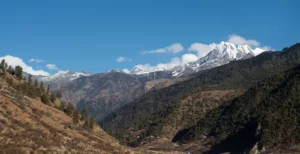
A Himalayan peak looks down on the village where Pastor Mael lives and serves.
Mael and Ulla gave them some of their own blankets.
It would be another long night. Chilled by the winter wind, Mael and Ulla wouldn’t sleep well. When the sun rose, would they be ready for it? Would they suffer from all-too-common headaches, lightheadedness and fatigue all day? Would they have energy to accomplish their work and face whatever the day held?
Life is hard for Pastor Mael, his family and the other people in their village, which lies under the glare of a Himalayan peak. The high-altitude terrain and the long winter, which lasts from November until March or April, pose challenges to basic living. Tucked away in a hard-to-reach village, people have few job options and depend primarily on agriculture and livestock for survival. But the forbidding climate means people can typically grow only one crop a year, such as potatoes or corn, and crops take a long time to mature. As a result, people struggle to earn a living. Poverty bars many from affording the vital protection of winter coats and blankets, items which can cost several months of wages.
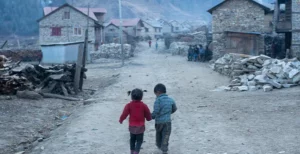
When winter sets in this country, schools close for winter vacation. Children roam about playing after the sun has risen. Because heated water is difficult to acquire, people often don’t take baths during this season.
Some seek additional income by cutting and selling firewood from the forest or trekking into the mountains to forage for medicinal herbs, leaves and fruits. But trekking even higher into the extreme climate of the Himalayan peaks without adequate winter clothing poses a health risk.
“Since people are poor, they don’t have sufficient warm clothes,” Pastor Mael explains. “They cannot carry blankets and heavy stuff to those Himalayan mountains. They go with whatever warm clothes they have, and they get sick because of the cold. Because they are exposed to such extreme cold, when they come back, they get sick and [sometimes] even die.”
The village’s remoteness also limits access to electricity, which is provided by a watermill. To conserve the modest amount of power the mill produces, electricity is available primarily at night. Sometimes, when the water freezes, the village residents don’t get electricity at all. Many people rarely bathe during the winter because they don’t want to get sick from dousing themselves with cold water.
Because they are exposed to such extreme cold, when they come back, they get sick and [sometimes] even die.
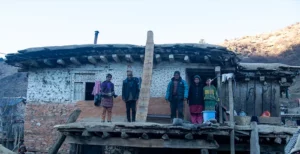
Pastor Mael, Ulla and their children moved to this village in 2016. Their house, like most others in the village, consists of stone, dirt and wooden posts—but, unfortunately, winter drafts still snake their way into the home.
But in this tough winter climate, people can’t entirely avoid getting sick, and when they do, they typically can’t access medical treatment. The nearest medical facility requires a five- or six-hour hike. And winter snowfall can make such a hike treacherous or impossible.
“There are people … who have perished because of being exposed to the cold, and even at home,” Pastor Mael says. “There are people who can die even staying home because they do not have sufficient warm clothes. Because most people are poor and don’t have sufficient resources, they don’t have enough warm clothes at home or blankets to keep themselves warm at night. So, when they contract pneumonia or sicknesses related to their lungs … their health gets worse.”
When the glittering sun rises in the morning, it brings a small but welcome comfort and prods life and activity to resume after dark winter nights. Each morning, sunbeams beckon people out of their homes to warm themselves in their yards or on rooftop terraces before going about daily chores. Each morning, people enjoy a slight boost in heat as light reflects off the Himalayan peaks.
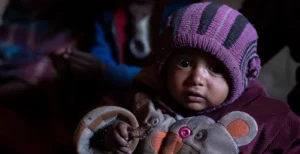
Pastor Mael’s young son. His family of eight needs ample winter clothing and blankets, but these items are very expensive in this region.
These glowing mornings, when the mountain peaks smile rather than glower, make life livable during winter—but they also gloss over the hardship of long, dark nights. The sun glares in the face of those who were too cold to get restful sleep. The sun doesn’t remember the people who died of pneumonia or other cold-aggravated illnesses and couldn’t get to a hospital or clinic. The radiant sky juxtaposes the horror of walking outside to find a lifeless body planted in the snow. Pastor Mael remembers at least three times when people in his village got drunk at night, stumbled to the ground and died of exposure.
Pastor Mael and his family moved to this village in 2016. Previously, they had lived in a lower-altitude region, but he was willing to move to this forbidding, mountainous area because he knew people there needed to hear of Christ’s love. Here, he has opportunities to share God’s love with people who need relief from the burdens of cold and poverty—and from the darkness of life without eternal hope.
Because Pastor Mael’s family lives in this village alongside the rest of the community, they understand the challenges that cold and remoteness pose to everyone. When they had only a few small blankets and bedsheets, the family of eight (Mael, his father and younger brother, his wife, his three daughters and his son) struggled to stay warm on long winter nights.
The family usually sleeps in the kitchen, which stores heat from the cooking fire, but when they didn’t have proper coverings, the cold still overwhelmed them. Sometimes the children couldn’t sleep due to the cold, so Mael and Ulla gave them some of their own blankets, sacrificing a good night’s sleep.
During the day, sleep deprivation gave Mael and Ulla less energy to do the difficult work of survival and ministry. Ulla must spend the day cooking, washing dishes, laundering clothes, hauling firewood from the forest and feeding her cows, which can’t graze when the ground is frozen.
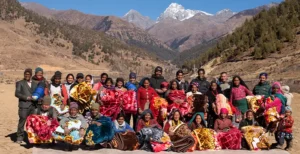
Pastor Mael, Ulla, four other GFA pastors and about 20 families from their community received winter coats or blankets.
Mael spends the day visiting families to encourage them, sharing a message of eternal hope and leading prayer meetings. This work requires hiking across rugged terrain, possibly for hours, so he needs quality winter clothing. For a while he had only a light jacket, not an adequate winter parka. Without sufficient outerwear, he had to wait until sunrise to head out. He also ran the risk of getting sick. One December, a cough and cold plagued him for weeks.
Mael knew he needed resources to stay healthy so he could minister the Gospel effectively. How could people experience life change if they didn’t hear the Good News? How would they hear it if Mael didn’t share it? And how could he share it if he were sick?
Pastor Mael and Ulla knew their need for warmth was a universal need—and they wanted everyone in their village to be safe from the cold. Even more than that, Pastor Mael wanted people to know Christ’s love for them. So Pastor Mael and his leaders organized a special event earlier this year.
Under one of those electric, golden-blue morning skies, Mael and Ulla gathered with a small crowd of people, about 20 families from their village and a group of GFA pastors. A common need united them all.
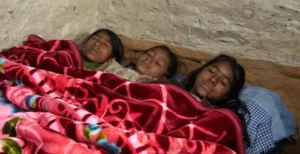
All three of Pastor Mael and Ulla’s daughters can share the new, warm blanket they received from GFA World.
On that bright morning, GFA World regional leaders handed out 20 plush, chunky blankets to families in need, including Pastor Mael’s own. They also gave Pastor Mael and four other pastors new coats to protect them as they travel to various homes and villages for ministry. Smiles brightened people’s faces as they received the valuable gifts—gifts that would keep them warm even when the sun wasn’t brightening the sky.
As he saw the men and women grasp their blankets with delight, Pastor Mael believed these compassionate gifts would show these people that God and His children cared for them—not just in words but in actions. He hoped that the gift recipients, some of whom were church members and others whom had yet to know Christ, would experience Christ’s love in a deep way. He hoped some people would even find new life.
“It has created a great impact in the hearts of both groups of people,” Pastor Mael explained. “The believers are very encouraged and happy because they know that the church or the [pastor] not only loves them but also helps them in times of need. The blankets and the winter clothes are the neediest thing during winter, and the church was able to supply their needs. The believers are very encouraged and happy. The same thing is with those who do not know Christ but received the blankets from the church yesterday. They are also very happy, and they have a good and positive attitude toward us. … I will be visiting them. I will be asking them how they are doing and how is the blanket, whether the blanket is good enough to make their family warm. I will tell them that this all happened because Christ loves you.”
Pastor Mael and Ulla knew that the new blanket and winter coat were answers to prayer for their family, too. Ulla tried the blanket out right away. After the first night of use, she could tell she would sleep better at night and have more energy during the day.
“Because of this jacket, I am so encouraged and happy that my church and leaders care for me, and they have given me this jacket. This encourages me to serve the Lord and work hard”.
“I can feel the difference because I was able to sleep properly last night,” she said. “My daughters and I slept under the blanket last night, and it was very warm. I felt I had sufficient rest last night. [This] morning, I was able to do everything, all my work, because I was warm and slept enough during the night. This blanket has been a great help for me.”
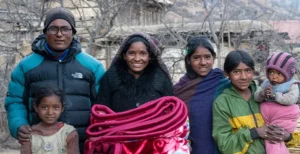
The new blanket will protect Pastor Mael’s family at night, and the new coat will increase his ability to minister to people during wintertime.
The first day Pastor Mael wore his new, thick coat, it kept him warm all day. He knew it would greatly help him continue in ministry, even in the face of chilling winter winds.
“Because of this jacket now I will be able to leave the house early morning, no matter how cold it is,” he said. “I will be able to go to the mission fields to share the Gospel to people, pray for the sick, those who need my ministry. Earlier I used to wait for the sun to rise, and when it was warm, then only I was able to walk around. But now I can leave the house even before the sunshine. I can leave the house and walk to the mission fields. Because of this jacket, I am so encouraged and happy that my church and leaders care for me, and they have given me this jacket. This encourages me to serve the Lord and work hard.”
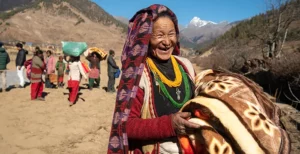
The gift of warm clothing and blankets brings hope to people who need basic wintertime protection
Just as the sun rises each morning, ending the dark night and offering the promise of a sliver of warmth, the simple gifts of blankets and coats symbolized a new day. They showed people there was a God who loved them, a God who could bring lasting hope for their village.
Pastor Mael and other GFA pastors sharing Christ in cold, impoverished communities persevere through hardships to bring people a light that, unlike the sun, never sets. Through gifts of winter clothing and blankets, you can equip national missionaries to continue their wintertime ministry and bless impoverished people in their communities with a lifesaving gift of warmth.
There are many ways you can fundraise, whether it’s a bake sale, a marathon, or a party!